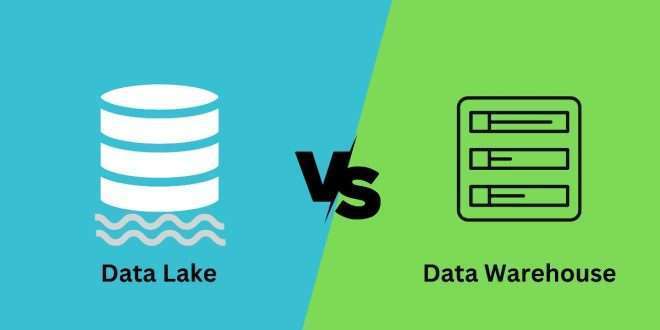In the realm of modern data management, businesses are constantly faced with the challenge of handling vast amounts of data efficiently and effectively. Two primary solutions have emerged to tackle this issue: Data Lakes and Data Warehouses. Choosing the right one can significantly impact a company’s ability to make data-driven decisions and gain a competitive edge. In this comprehensive blog, we will explore the key differences between Data Lakes and Data Warehouses, helping you make an informed decision that best suits your business needs.
What is a Data Lake?
A Data Lake is a centralized repository that stores raw and unprocessed data from various sources, such as IoT devices, social media, logs, and more. Unlike Data Warehouses, Data Lakes adopt a schema-on-read approach, meaning data is only structured when it is accessed or analyzed. This flexibility allows businesses to store large volumes of diverse data types without the need for predefined schema definitions.
Data Lakes are designed to handle massive amounts of unstructured and semi-structured data, making them an ideal choice for organizations dealing with big data challenges. By utilizing distributed computing frameworks like Apache Hadoop or Apache Spark, Data Lakes can efficiently process and analyze vast datasets.
Key Points:
- Schema-on-read approach for data flexibility.
- Stores raw and unprocessed data from diverse sources.
- Ideal for big data and unstructured/semi-structured data.
What is a Data Warehouse?
A Data Warehouse, on the other hand, is a structured repository that stores data from various sources after it has been transformed and organized. Unlike Data Lakes, Data Warehouses use a schema-on-write approach, where data is structured and organized before being loaded into the warehouse. This upfront structuring ensures data quality and consistency, making it easier for business analysts and decision-makers to access and interpret the information.
Data Warehouses are designed for business intelligence and reporting purposes, providing a consistent and reliable view of the data. They are best suited for structured data and analytical queries, making them an excellent choice for organizations seeking to derive insights from historical data.
Key Points:
- Schema-on-write approach for data consistency and reliability.
- Stores structured data after transformation and organization.
- Ideal for business intelligence and historical data analysis.
Data Lake or Data Warehouse: Which One to Choose?
Now that we understand the fundamental differences between Data Lakes and Data Warehouses, let’s explore the key factors that can influence your decision-making process.
Data Variety and Flexibility
Data Lake:
If your organization deals with a wide variety of data types, such as text, images, videos, or log files, a Data Lake is a more suitable choice. It accommodates diverse data formats without the need for upfront data modeling, providing the flexibility to ingest and process data in its raw form.
Data Warehouse:
On the other hand, if your primary focus is on structured data, and you require consistent and predefined schemas, a Data Warehouse is the way to go. It ensures data quality and standardization by transforming and organizing data before storage.
Data Processing and Performance
Data Lake:
Data Lakes excel in parallel processing and can handle massive volumes of data with distributed computing frameworks. However, due to their schema-on-read approach, querying raw data can sometimes be slower compared to Data Warehouses.
Data Warehouse:
Data Warehouses are optimized for analytical queries and deliver faster response times due to their schema-on-write approach and pre-aggregated data models. However, they may face challenges when handling unstructured data or real-time data streams.
Cost and Scalability
Data Lake:
Data Lakes offer cost advantages as they can be built on inexpensive storage solutions, such as cloud-based object stores. Moreover, they provide horizontal scalability, allowing you to expand storage as your data grows.
Data Warehouse:
While Data Warehouses may have higher initial costs due to the need for specialized hardware and software, they can provide cost efficiencies through data compression and optimization. Vertical scaling can be more challenging, requiring hardware upgrades as data volume increases.
User Accessibility and Skill Set
Data Lake:
Data Lakes offer data accessibility to a broader audience since users can access raw data without extensive SQL knowledge. This democratization of data empowers data scientists and analysts to explore and analyze data directly.
Data Warehouse:
Data Warehouses are more suitable for business analysts and users familiar with SQL or BI tools. The structured nature of data simplifies querying and reporting tasks.
Data Governance and Security
Data Lake:
Data governance can be more complex in Data Lakes, as data is often ingested without strict controls. Implementing security measures and access controls becomes crucial to maintain data integrity.
Data Warehouse:
Data Warehouses are designed with a focus on data governance and security. With predefined schemas, access controls, and auditing capabilities, maintaining data integrity is more straightforward.
Commonly Asked Questions
Q1. Can I use both Data Lake and Data Warehouse in my organization?
Absolutely! Many organizations adopt a hybrid approach, leveraging both Data Lakes and Data Warehouses to address different data needs. For example, raw data can be stored in a Data Lake for exploration, while aggregated and structured data can be stored in a Data Warehouse for reporting and analytics.
Q2. How do I decide which solution is best for my business?
The decision depends on your specific use cases and data requirements. If your data is diverse, unstructured, and requires exploration, a Data Lake might be the right fit. On the other hand, if you focus on business intelligence and need a reliable data repository, a Data Warehouse would be more suitable.
Q3. Are Data Lakes more cost-effective than Data Warehouses?
Data Lakes often offer cost advantages, especially when built on cloud-based storage solutions. However, the overall cost-effectiveness depends on factors such as data volume, infrastructure, and data processing requirements.
Q4. Can I integrate my existing data infrastructure with a Data Lake or Data Warehouse?
Yes, both Data Lakes and Data Warehouses can be integrated with existing data infrastructure. However, it’s essential to consider data migration, compatibility, and potential data transformations during the integration process.
Q5. Is data security a concern in Data Lakes?
Data security is a crucial aspect of Data Lakes, given the raw and diverse nature of the data stored. Implementing strong access controls, encryption, and monitoring mechanisms can help mitigate security risks.
Final Words
In conclusion, choosing between a Data Lake and a Data Warehouse depends on your organization’s specific data requirements, processing needs, and budget constraints. Data Lakes offer flexibility and scalability for handling diverse and unstructured data, while Data Warehouses excel in providing structured, consistent, and reliable data for analytical purposes. To maximize the potential of your data and gain actionable insights, a hybrid approach may be the best strategy for your business. Remember, understanding your data needs and aligning them with the right solution will empower your organization to make data-driven decisions, stay competitive, and thrive in today’s data-driven world.
 webfily
webfily



